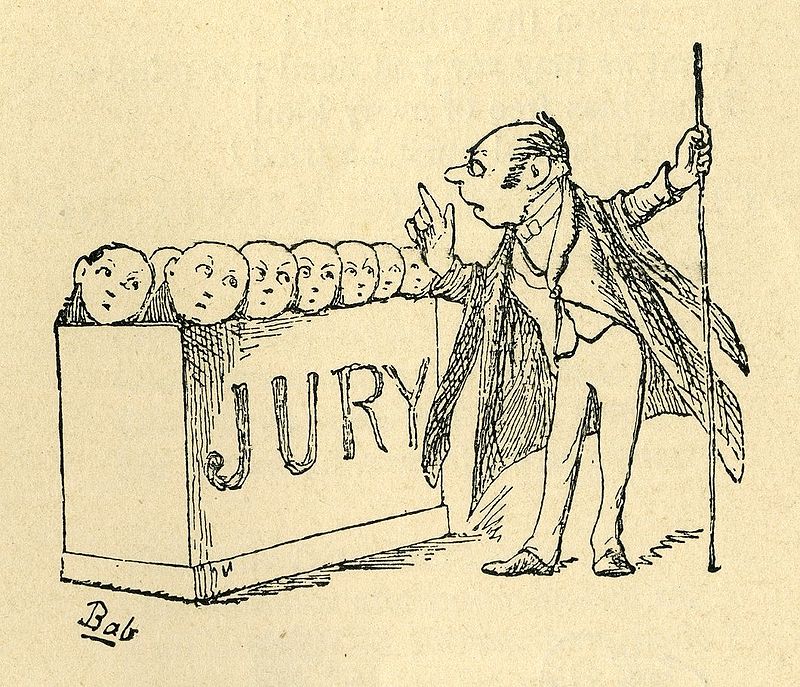Weekly Notes: legal news from ICLR – 10 June 2016
This week’s roundup of legal news and commentary includes threats to jury trial, contemptuous snapping in court and social media outside of it, sumptionsplaining the family law, sentencing plans and a chance to write new laws. (Apologies for late posting, delayed by conference activities.) Juries Twin threats to jury system This week saw news of… Continue reading
This week’s roundup of legal news and commentary includes threats to jury trial, contemptuous snapping in court and social media outside of it, sumptionsplaining the family law, sentencing plans and a chance to write new laws. (Apologies for late posting, delayed by conference activities.)
Juries

Twin threats to jury system
This week saw news of two threats to the jury system which dates back in one form or another to ancient Greece and was instituted in its current form in the reign of Henry II, father of the common law, before being (as politicians like to say) “enshrined” in Magna Carta.
First, and not for the first time, there was a suggestion from the senior judiciary, giving evidence to the Commons justice select committee this week, that fewer offences should attract the right to elect trial by jury. Lord Justice Fulford told the committee:
“We need to look again at these cases. We think there is a strong argument for reviewing the right to jury trial with some low-end offences.”
Or to put it another way, the threshold for the option in cases triable either way would be raised, leaving more cases to be resolved only at magistrates’ court level. Sir Brian Leveson said something similar in his review of criminal court efficiencies last year.
The suggestion has not gone down well with the criminal Bar, as you may detect if you read CrimBarrister’s blog post, Dial M for McJustice!
Then there came news of a stern warning by the Lord Chief Justice, Lord Thomas of Cwmgiedd, over the risk to trials caused by jurors resorting to social media or in other ways breaching their solemn undertaking to try cases objectively and fairly on the evidence presented.
In two cases he imposed suspended sentences of imprisonment on jurors for contempt of court in breaching that undertaking, in one case by looking up and informing other jurors of the criminal record of a defendant, causing the instant trial to be aborted at huge public expense; in the other by communicating privately with two defendants and demonstrating a bias in their favour. The cases were brought by Robert Buckland, QC, the solicitor-general, who announced the decisions here: Two Jurors Found Guilty of Contempt of Court
See also: Cameras in Court (below).
Family law
Child Protection Conference 2016
This year’s Child Protection Conference, #CPConf2016, staged in Birmingham on 3 June, was a great success. The multidisciplinary conference is the brainchild of Sarah Phillimore and is organised by the Transparency Project, supported by a number of sponsors.
Last year’s conference having concluded that the system wasn’t fit for purpose, this year’s conference title, Where do we go from here? reflected a desire to identify what practical and sustainable changes needed to be made to allow social workers to carry out their necessary work to help and support families – and to allow families to accept that help and support without feeling frightened or brutalised by a process they often do not understand.
Hearing from lawyers, academics, social workers and from those who, as parents, adoptive parents or children, have been through the system, the conference was able to pool and share a variety of views. Lack of resource was a major theme in much of the discussions, and frustration at the lack of leadership and cooperation, as well as the unforeseen consequences of sometimes ill-considered policy shifts and reversals.
Transparency, accountability and promoting public understanding of the justice system was another major theme, reflected in the introduction by District Judge Gailey which has already been reported separately on this blog here.
An account of the conference has now been written by Phillimore on the Transparency Project blog here. CPConf2016 – How did it go?
McKenzie Friends
One of the topics for general discussion was the benefit or otherwise in child protection and other family court hearings, of McKenzie Friends, whether of the voluntary or so-called “professional” (ie fee-charging) variety. This week the Transparency Project submitted its collective response to the official consultation on the subject.
No law is an island

At another recent family law conference, the Family Law Bar Association’s “At a Glance” conference, Lord Sumption gave a speech entitled Family Law at a Distance, in which he basically put paid to any idea that family law was a different species of law, isolated from the mainland of legal principles applicable to cases generally.
Sumption explained that he had never practised in the Family Division, but his own practice as a barrister had been broader than most (“At the bar, I liked to trespass on other people’s cabbage patches), legal specialisms were in his experience “essentially bogus”, and the only specialism he now feared to tread in was chemical patents.
“Yet even by the standards of legal specialists, family law seems usually self-contained to an outsider”.
This was, in his view, a Bad Thing. But it was getting better. In cases such as Prest v Petrodel Resources [2013] UKSC 34; [2013] 2 AC 415 the Supreme Court had construed section 24 of the Matrimonial Causes Act 1973 by reference to principles of law of general application, not according to some special principle of family law. Sumption had said at the time that
courts exercising family jurisdiction do not occupy a desert island in which general legal concepts are suspended or mean something different”.
You can read his speech here (PDF).
The speech ruffled a few feathers on Twitter, with some practitioners taking umbrage at what was described as “sumptionsplaining” (a derivation of “mansplaining” which I understand to be the practice of men patronisingly explaining feminism to women, and by implication any outsider having the temerity to explain a technical subject to someone rather better versed in it than him or herself – a bit like teaching one’s grandmother how to suck eggs). This was duly (and gleefully) reported on Legal Cheek next day.
Then, over the weekend, at least one set of feathers was un-ruffled, as Lucy Reed confessed with commendable (and wholly typical) honesty on her Pink Tape blog, Let me Explain…
Sumption makes some good points about how there have been a number of notable boo boos where the family bar and judiciary seem to have behaved as if they operate in some slightly different dimension where general legal principles can be distorted or ignored. Damn him, he’s right.
Cameras in court
Contempt ruling
The Solicitor-General has been busy with other prosecutions for contempt of court, including a case in which two men were found to have taken photographs in a courtroom: HM Solicitor-General v Cox and Another [2016] EWHC 1241 (QB). The case is written up in a recent blog post on the suesspiciousminds blog, Taking Photographs in Court.
Kyle Cox and Damien Parker-Stokes were two friends of a defendant being tried for murder. They attended court during the trial and took photographs within the courtroom. Some of the images were uploaded on to various Facebook pages, with comments, including one that said “Fuk the judge!”. Notices warning members of the public against taking photographs were clearly visible in some of the photographs taken.
The case came before the Lord Chief Justice, sitting with Ouseley J in the Divisional Court of the Queen’s Bench Division. Both were found in contempt of court, and although they have not yet been sentenced, they are likely to face a custodial penalty rather than simply the maximum fine of £1000 under s.41 of the Criminal Justice Act 1925, which makes it a criminal offence to take photographs in court.
Sentencing
Sentencing council – business plan
The Sentencing Council has issued its latest Business Plan for 2016-17. The council is chaired by Sir Colman Treacy (Lord Justice) and its main job is to issue sentencing guidelines for different kinds of offence. These are first subject to a consultation process before being finalised. It also monitors and evaluates the effect of those guidelines, and promotes awareness of sentencing practice. Over the next few years, according to the Gazette, guidelines for knife possession, child cruelty, stalking and domestic abuse will come under the spotlight.
Read the full business plan (PDF).
Parish News
Job of the Week
Assistant Parliamentary Counsel
Drafting Government Bills at the Office of the Parliamentary Counsel offers outstanding opportunities for really able lawyers. The Cabinet Office is currently looking for four barristers or solicitors with “excellent powers of analysis, the ability to think creatively and constructively and to express ideas clearly, and the resilience to work under pressure”. They will need to have a good degree (2:1 or above) or evidence of equivalent high level academic or professional achievements. Find out more.
Closing date for applications: 6 Jul 2016
Law (and injustice) from around the world
China
Rule of law in tatters
The fate of lawyers in China was starkly illustrated by a report via the BBC of what happened when Wu Liangshu went to the Qingxiu District Court in Nanning. When he came out again, he said he had had his clothes torn off him by police – allegedly trying to relieve him of his mobile phone, which he refused to give up. He refused to accept the offer of a new set of clothes, preferring to highlight the fate which he claims is not unusual for lawyers who stick their necks out on behalf of clients rather than kowtowing to court officials.
A report in the Hong Kong Free Press adds the following detail:
The skirmish between court police and Wu happened … as Wu was filing a civil case in court. The court police suspected Wu was recording the proceedings with his mobile phone. When Wu refused to hand over his phone, the police forcibly grabbed it from his pocket…
The police did not manage to find a recording on his phone afterwards, and offered him a new pair of pants, which he refused…
Among the comments, later censored, on Weibo (a Chinese social media site) were these, according to the BBC:
- “In China, lawyers can’t even defend their own rights, how can they defend their clients”
- “You can tell just how Chinese human rights are from this picture”.
Or as we say in this jurisdiction, res ipsa loquitur.
That’s it for now. My thanks to all who led me to stories, mostly my followees on Twitter.
This post was written by Paul Magrath, Head of Product Development and Online Content at ICLR, who also tweets as @maggotlaw. It does not necessarily represent the opinions of ICLR as an organisation. Comments welcome on Twitter @TheICLR.
